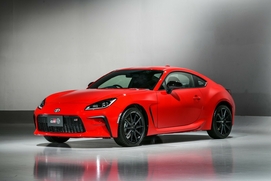-20% on the entire catalog today
Free shipping starting from $18
- Back to home
- You are here : Blog News Japan stops supplying electric vehicles to Russia due to Ukraine invasion sanctions
Japan stops supplying electric vehicles to Russia due to Ukraine invasion sanctions
Published by The team in News the 08/08/2023 at 15:02

The Japanese government introduces new sanctions against Russia, approved by Prime Minister Fumio Kishida. From August 9, 2023, Tokyo will no longer deliver electric vehicles to Russia.
Wave of sanctions against Russia and its impact on the automotive industry
A wider wave of sanctions was passed by Japan against Russia in response to the invasion of Ukraine. At the end of July, the Ministry of Economy, Trade and Industry decided to impose an embargo on certain goods to increase Russia's isolation. This embargo notably concerns thermal vehicles of 1,900 cm³ or more, as well as hybrid and electric cars.
Objective: deprive Russia of technologies and industrial equipment
The extension of the sanctions stems from a decision taken by G7 leaders at a summit held in Japan in May. The objective is clear: to deprive Russia of G7 technologies, industrial equipment and services that support its war enterprise. This historic ban on electric vehicles by Japan should last until the end of the war. Automakers such as Toyota, Honda, Mitsubishi, Nissan and Mazda will therefore stop exporting all-electric vehicles, electric motor-based powertrains and lithium-ion batteries to Russia.
Alignment of Japan with the sanctions imposed by the United States and the European Union
By taking this decision, Japan is joining the sanctions already imposed by the United States and the European Union. A Japanese ministry official said: "As a year has passed since Russia invaded Ukraine, we have extended the list of items subject to the export ban." Thus, the majority of European, American and now Japanese electric cars, as well as hybrid and electric vehicle types will no longer be available on the Russian market. This will benefit Chinese manufacturers who, having not officially condemned the Russian invasion, are seeing their all-electric models, based on the electric motor and lithium-ion batteries, gradually replacing European, Japanese and Korean vehicles on Russian territory. .
Consequences for the automotive industry and the environment
It is important to note that the purchase of an electric vehicle is now hampered by these sanctions, and Japanese manufacturers will no longer be able to supply electric cars to Russia. This decision may also have an impact on the lithium industry, which is an essential element of lithium-ion batteries used in electric cars. At the same time, this situation could encourage the adoption of more environmentally friendly solutions, thus reducing dependence on polluting vehicles, and push governments to offer incentives such as the conversion bonus to encourage citizens to opt for clean and electric.
Impact on the Russian market and the rise of Chinese manufacturers
With the embargo on electric vehicles from Japan, the Russian market is deprived of access to all-electric models from the major Japanese manufacturers. This could lead to an increase in demand for vehicles with traditional and hybrid engines available locally. However, the shortage of electric cars from well-known brands could also boost interest in Chinese automakers.
China, which has not officially condemned Russia's invasion of Ukraine, is in a position to take advantage of this situation. Its automakers can increase their exports of electric vehicles to Russia, while European, Japanese and Korean cars are now absent from the market. With the rapid development of the Chinese auto industry, these brands could emerge as attractive alternatives for Russian consumers looking for electric cars.
Economic and environmental consequences
The war in Ukraine and the resulting sanctions have a significant economic impact on Russia. The automotive sector is not spared, and sales figures reveal a drastic drop in sales of new vehicles in Russia. This situation could have repercussions on employment and the Russian automotive industry as a whole.
On the environmental side, the absence of new electric cars on the Russian market could also have adverse effects in terms of reducing polluting emissions. Electric vehicles play a crucial role in the transition to cleaner mobility, and their unavailability could slow progress towards decarbonization goals.
Encourage green alternatives and government incentives
Faced with this situation, Russian governments could be encouraged to put in place incentives to promote the adoption of electric vehicles produced locally or from countries that have not imposed an embargo. Policies such as the conversion bonus, tax incentives or subsidy programs for electric cars could be considered to stimulate the market and promote green alternatives.
In conclusion, the halt in the supply of electric vehicles from Japan to Russia due to the sanctions linked to the invasion of Ukraine has important implications for the Russian automobile market and the rise of Chinese manufacturers. This situation also raises economic and environmental issues that require coordinated actions to encourage the adoption of more sustainable mobility solutions.
Post a comment
Order safely
Quick delivery
By your side 7 days a week !
14 days to change your mind
Subscribe to the newsletter




